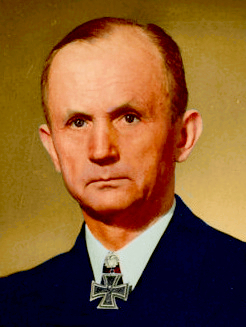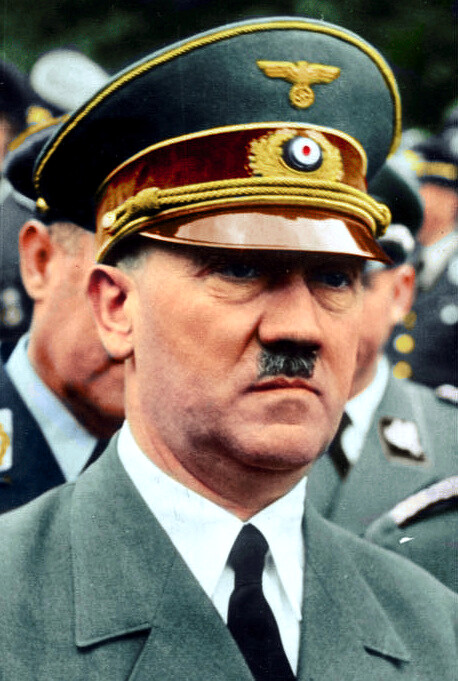- Сегодня, 1 мая в 4 часа, на участок 8-й гвардейской армии явился начальник генштаба сухопутных войск немецкой армии генерал инфантерии КРЕБС, который передал ЧУЙКОВУ для передачи Верховному Советскому командованию письменное заявление за подписью ГЕББЕЛЬСА и БОРМАНА следующего содержания:
Берлин, 30 апреля 1945 г.
Имперская канцелярия.Сообщение.
Мы уполномочиваем начальника генерального штаба сухопутной армии генерала пехоты Ганса КРЕБС для передачи следующего сообщения: Я сообщаю вождю Советских народов, как первому из не немцев, что сегодня 30 апреля 1945 г. в 15.50 вождь немецкого народа Адольф ГИТЛЕР покончил жизнь самоубийством.
Соответственно законно отданных им распоряжений (завещания), он передал свою власть и ответственность гросс-адмиралу ДЕНИЦ, как президенту империи и министру доктору ГЕББЕЛЬС, как Имперскому канцлеру, а также назначил исполнителем своего завещания своего секретаря Рейхсляйтера Мартина БОРМАН.
Я уполномочен новым Имперским канцлером и секретарем Адольфа ГИТЛЕРА Мартином БОРМАН, установить непосредственный контакт с вождем Советских народов. Этот контакт имеет целью выяснить в какой мере существует возможность установить основы для мира между немецким народом и Советским Союзом, которые будут служить для блага и будущего обоих народов, понесших наибольшие потери в войне.
Доктор ГЕББЕЛЬС
БОРМАН
ПРИМЕЧАНИЕ К СООБЩЕНИЮ:
-
Причина смерти Адольфа ГИТЛЕРА - военное поражение в войне, надежда освободить для немецкого народа дорогу для нового будущего, для которого он сам более не может создать достаточные предпосылки.
-
Состав единственного легального правительства в Германии назначенного фюрером:
Имперский президент - Гросс Адмирал ДЕНИЦ;
Имперский канцлер - доктор ГЕББЕЛЬС;
Министр иностранных дел - доктор ЗЕЙССС-ИНКВАРТ;
Министр по делам партии Мартин БОРМАН;
Главнокомандующий сухопутной армией - генерал-фельдмаршал ШЕРНЕР;
Главнокомандующий ВВС - фельдмаршал фон-ГРЕЙМ;
Главнокомандующий морским флотом - Гросс-Адмирал ДЕНИЦ;
Министр внутренних дел - гауляйтер ГИСЛЕР;
Командующий войсками СС и начальник немецкой полиции - гауляйтер ХАНКЕ.
- На наши вопросы:
а) Где застрелился Гитлер и где находится сейчас его труп?
Кребс ответил -
Что Гитлер застрелился в Берлине, а труп сожжен согласно завещания 30.4.45 г.
б) Когда Геббельс и Борман будут объявлять народу о самоубийстве Гитлера и о его завещании?
Кребс ответил -
Объявлять о самоубийстве Гитлера и его завещании мы не будем, т.к. об этом узнает Гимлер и воспользуется этим для создания своего правительства.
Кроме того у нас в Берлине нет средств связи для объявления. Мы думаем объявить о смерти Гитлера и о создании нового правительства после перемирия и открытия переговоров о мире.
в) Знает ли Геббельс, Борман и другие о том, что Гимлер обращался к англичанам и американцам с предложением о безоговорочной капитуляции?
Кребс ответил -
Что об этом ему стало известно только от Советского Командования и что Геббельс, Борман и другие об этом, якобы, не знают. Насчет Гимлера, Кребс добавил, что Гимлер - это предатель, он очень нечестно относился к Гитлеру, обманывал его, не выполнил приказа о снятии войск с западного фронта на защиту Берлина и за это исключен из партии.
г) Будет ли объявлено Гимлеру, армии и народу о том, что Гимлер оказался предателем и что он исключен из партии?
Кребс ответил -
У нас нет связи для передачи и это будет сделано тогда, когда будут налицо условия перемирия и когда будет легализовано новое правительство.
На вопрос, не лучше ли это сделать сейчас, чтобы знали армия и народ о Гимлере, как о предателе, Кребс ответил - это должен сделать Геббельс.
д) Где сейчас находятся: Геринг, Гимлер, Риббентроп, Гудериан и какую роль они будут играть в проектируемом правительстве?
Кребс ответил -
Что завещанием Гитлера в правительство эти лица не включены. Геринг находится в Баварии на территории, уже оккупированной союзниками. Риббентроп и Гимлер находятся в Меклебурге.
Гудериан болен и с 15 марта освобожден от должности начальника Имперского штаба, а вместо него Гитлером на эту должность назначен я - Кребс.
е) Кто сейчас является Верховным Главнокомандующим, кто начальником штаба Ставки?
Кребс ответил -
Верховным главнокомандующим будет Гросс адмирал ДЕНИЦ, сейчас он находится в Меклебурге. Там же находится и Ставка.
ж) На наш вопрос, не думает ли Геббельс сдать Берлин в виду безнадежного положения гарнизона?
Кребс ответил -
Что Геббельс без Деница не может принять решения о капитуляции и сдачи Берлина, но так как Дениц находится в Меклебурге, то Кребс просил разрешения послать своего офицера на машине через линию нашего фронта за получением указаний.
- Из разговоров с Кребсом, я сделал вывод, что главной целью Геббельса является прощупать возможность признания со стороны Советского Правительства проектируемого правительства Германии (составленного по указанию Гитлера) и прощупать возможность начать переговоры о перемирии.
Сдавать Берлин на условиях безоговорочной капитуляции до получения гарантии о перемирии Геббельс и Борман не считают возможным. Посылку немецкого офицера в Меклебург к Деницу через линию нашего фронта, я не разрешил.
Примечание: Подлинные документы за подписью Геббельса и Бормана хранятся в штабе фронта.
п.п. Г. ЖУКОВ
Передано по телефону ВЧ в 10.35 1.5.45 г.
Принял дежурный Генерал Генерального Штаба Красной Армии - Генерал-Майор СОКОЛОВ.
Передал генерал-лейтенант И. БОЙКОВ
снята копия в 2 экз. мл.
верно: СТАРШ. ПОМ. НАЧ. ОТДЕЛА ПО ИСПОЛЬЗОВАНИЮ ОПЫТА ВОЙНЫ ОПЕРУПРАВЛЕНИЯ ПОДПОЛКОВОНИК ПАВЛОВСКИЙ.
DISCLAIMER: In light of the news from Berlin of the battle’s end, and partly as a criticism of Sparty’s approach to the topic in the comments section, I have created a new thread solely focused on the death of Adolf Hitler. The deaths of Dr. Goebbels and others are also mentioned here.
The articles up to May 4 posted here were already posted in the “Battle of Berlin” and “America at war” threads, with new articles published after May 4 to be posted in this thread alone.

